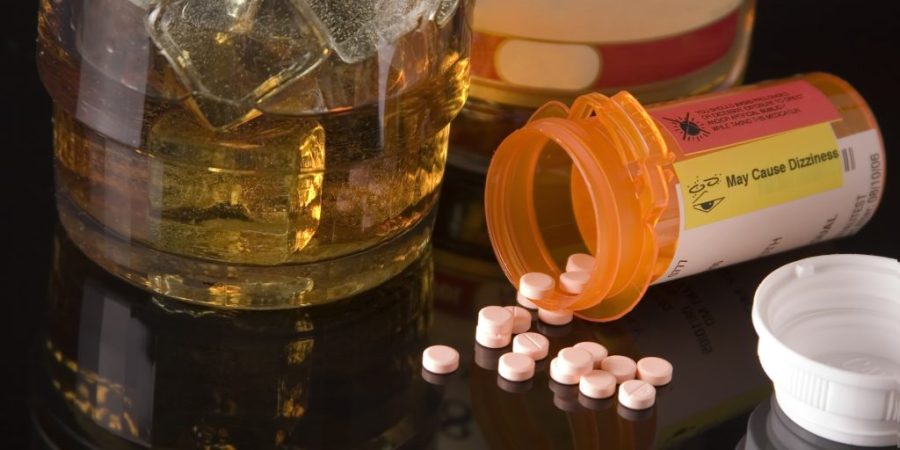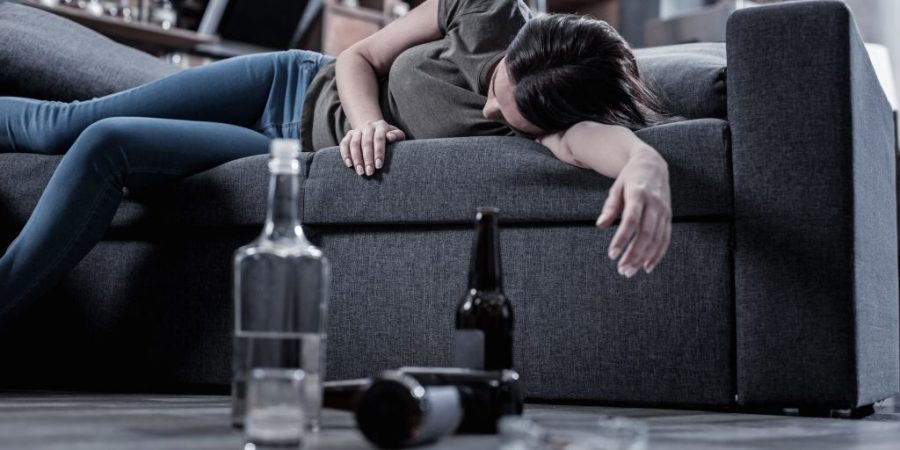
Between COVID-19, racial tension, and political unrest, the United States had a rough 2020. However, before these events even hit the U.S., anxiety disorder was already the most frequently diagnosed mental illness among Americans. As coronavirus cases swept across the country, anxiety-related symptoms among residents continued to increase, and the prescription of Xanax (alprazolam) and other anti-anxiety meds flourished.
Unfortunately, new stressors associated with lockdowns and disrupted routines also paved the way for unhealthy coping mechanisms and increased alcohol consumption. Given the number of new anti-anxiety prescriptions and the uptick in stress drinking throughout the last year, it is important to revisit the potential interactions between prescription medications and other drugs, namely, Xanax and alcohol.


Table of Contents
Xanax and Alcohol – Xanax Uses and Side Effects
Medications to treat anxiety are commonplace. The best medications for anxiety and panic disorders are thought to be benzodiazepines (benzos), the class of drugs that Xanax belongs to. Xanax and other benzos act as a calming medication and reduce anxiety by increasing a chemical in the brain called GABA. When taken as prescribed for a short duration, Xanax can be an effective tool against anxiety.
However, longer-term use of Xanax is associated with dependence and withdrawals, all of which may be worsened by mixing Xanax with alcohol. Naturally, Xanax dosages and the duration of use will largely influence the side effects and possible interactions that Xanax may cause.
Taken by itself, side effects of Xanax use include:
- Drowsiness
- Slowed breathing
- Dry mouth
- Dizziness
- Blurred vision
Taken with alcohol, the side effects of Xanax side effects are amplified and can be dangerous.
Xanax and Alcohol Interaction: The Dangers of Combining Depressants
Xanax and alcohol are both depressants. Depressants act by reducing brain activity and slowing down the central nervous system (CNS). Alcohol and Xanax also enhance one another, meaning that when taken together the effects of each substance are stronger than if taken alone.
When this overload of depressants saturates the body, it can begin to slow down to the point of shutting down. Therefore, if you’re mixing Xanax and alcohol, it can result in the following Xanax overdose symptoms:
- Nausea
- Excessive drowsiness or inability to stay awake
- Reduced motor control and susceptibility to falling
- Inability to concentrate
- Erratic behavior or delirium
- Slowed pulse and difficulty breathing
- Seizures or respiratory arrest
Ultimately, the slowed breathing and respiratory function that signifies an overdose on depressants can decrease the amount of oxygen that’s delivered to the brain. This can result in brain damage.
How to Handle a Xanax and Alcohol Overdose


Medical attention is necessary if you notice symptoms of alcohol and Xanax overdose. After calling 911, attend to the individual by trying to keep them awake. If they are already unconscious, roll them onto their side to reduce the risk of choking if vomiting occurs.
These overdose symptoms apply to not only Xanax but any benzodiazepines taken with alcohol. Other common anxiety medications that act as depressants include:
- Valium (diazepam)
- Klonopin (clonazepam)
- Halcion (triazolam)
- Prosom (estazolam)
If you take Xanax regularly and you’re wondering how long after drinking you can take Xanax, remember that alcohol is thought to increase the toxicity of alprazolam (Xanax) by a significant percent. The easiest way to evade Xanax and alcohol overdose symptoms is to avoid taking the medication with alcohol altogether.
Alternatives to Benzodiazepines for Anxiety
Dealing with anxiety can be challenging. And while effective, benzodiazepines can lead to physical dependency even when taken as prescribed. Fortunately, when learning how to manage anxiety, Xanax and other benzos are not the only treatments available. Below are some common alternatives to consider when you’re coping with anxiety (ultimately, the best way to deal with anxiety for you will be determined by you and your practitioner and nothing should be taken without consulting a doctor).
Alternative Medications for Handling Anxiety
There are a number of non-habit-forming alternatives to benzodiazepines for anxiety disorder. Keep in mind that while these medications may not have as high of a likelihood for addiction, they will come with their own list of interactions and side effects.
Antidepressants for Anxiety
SSRI antidepressants such as Zoloft, Prozac, and Paxil are options for longer-term anxiety management. However, these medications take a month or two to take effect and must be used regularly for continued relief of anxiety. Additionally, antidepressants come with a risk of withdrawal if suddenly stopped and must be stepped down gradually.
Antihistamines for Anxiety
Antihistamines are used to treat allergic reactions and can be prescribed or over-the-counter. Because of the sedative effect that antihistamines provide, they can also be used as a way to help anxiety.
For example, Benadryl (diphenhydramine) is an over-the-counter medication that may offer temporary relief of anxiety symptoms. A prescription antihistamine similar to Benadryl called Vistaril (hydroxyzine) may also be recommended. However, these medications are known to cause drowsiness, therefore they must be taken with caution.
Beta-Blockers for Anxiety
Beta-blockers, such as propranolol, are prescribed to treat blood pressure and other heart-related issues. Because these medications reduce the body’s physical responses to adrenaline (for example, rapid heart rate), they are also thought to ease the physical symptoms associated with panic or anxiety. Beta-blockers do come with risks, such as allergic-reaction or severely low blood pressure, and evidence of their efficacy to treat anxiety disorder is currently lacking.
Natural Alternatives to Xanax for Anxiety


Before you begin taking medications for anxiety, a natural alternative to Xanax includes mental health therapy and lifestyle changes.
Mental health therapy (for example, cognitive behavioral therapy) can help you get to the root of your anxiety and teach you how to respond to anxiousness. While coping with anxiety without medications may or may not be a viable option, these anxiety tips can help combat symptoms when they arise.
Additionally, lifestyle adjustments such as prioritizing sleep, exercise, nutrition, and meditation can assist in reducing anxiety without Xanax. Remember that any chemical that you ingest can affect the brain’s chemistry and increase feelings of anxiousness. Therefore, adjusting your lifestyle by reducing or eliminating drug and alcohol intake can also help make strides in reducing anxiety.
Getting Help for Xanax and Alcohol Abuse
In the end, there are numerous anxiety treatment options. However, when combining any of them with alcohol, you increase the risk of side effects and worsened symptoms. If you’re struggling with the overuse of Xanax, alcohol, or the combination of the two, we can help.
First, rest assured that you are not alone. At the Vance Johnson Recovery Center, we understand that substance abuse often accompanies anxiety due to the desire to find relief from distressing symptoms.
Both Xanax and alcohol carry risks if suddenly stopped. Here, our team of medical professionals will ensure that these substances are eliminated from your system safely and comfortably so that other therapeutic treatments can begin. Further, our accredited addiction treatment facility offers a holistic approach to treating addiction. This means that we will take you and your personal circumstances into consideration when constructing a recovery plan.
To learn more about the services provided, please contact our admissions specialist at 888-828-2623, or reach us through our confidential contact form. Most often we can get you admitted on the same day that you call so that you can get started on your recovery goals.
The post Xanax & Alcohol Don’t Mix, Try This Instead appeared first on Vance Johnson Recovery Center.
Source
Original Author: Vance Johnson Recovery Center

